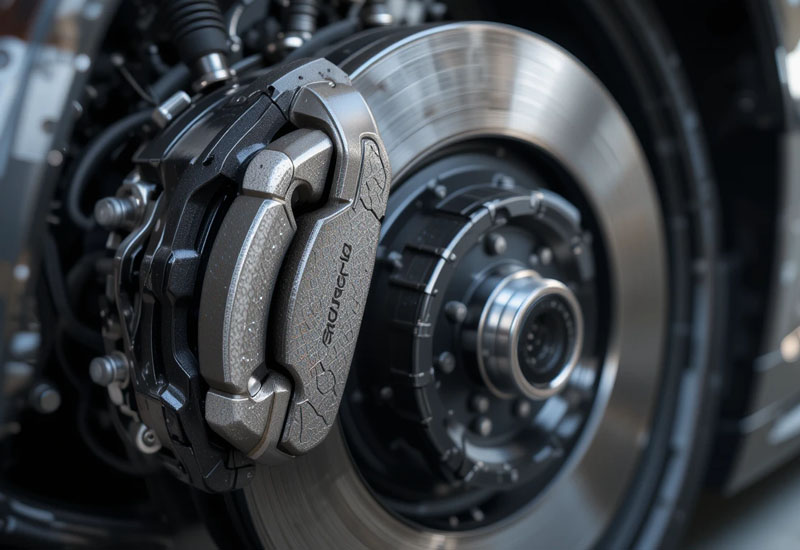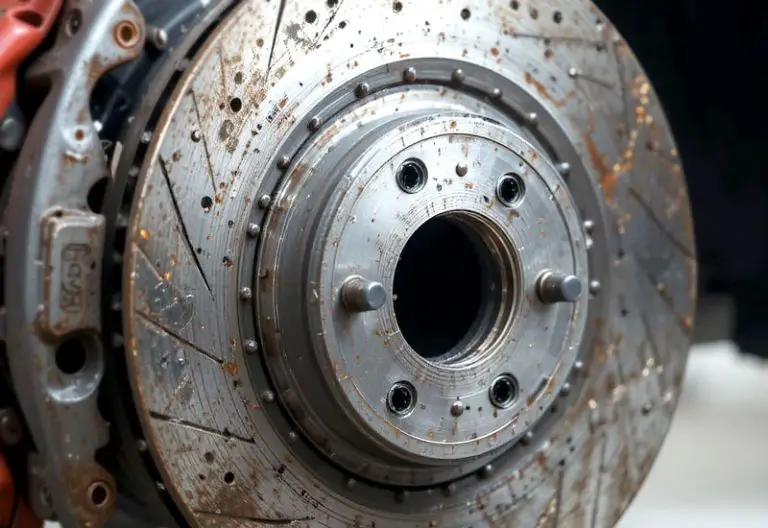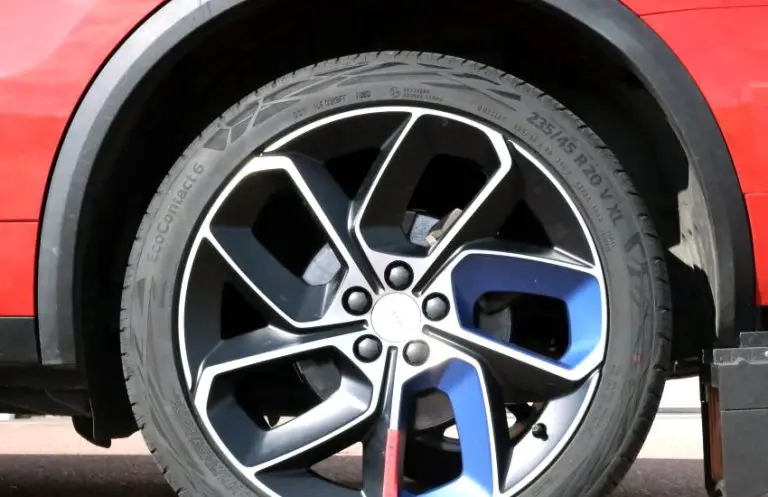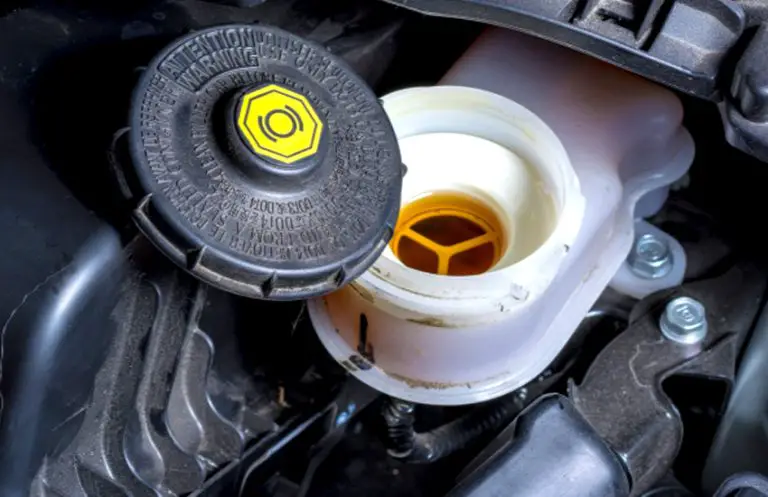Ever noticed that strange smell coming from your car’s brakes? It’s a common concern, but if you’ve ever wondered whether ceramic brake pads emit odors, you’re not alone. In this blog post, we’re going to dive into everything you need to know about ceramic brake pads, why they might smell, and how to prevent any unwanted odors. Let’s start with a simple fact: brake pads are essential for stopping your car, but they don’t always stay as “odor-free” as we’d like.

Understanding Ceramic Brake Pads
When you press the brake pedal in your car, the brake pads clamp down on the brake rotor, creating friction that slows down the wheels. Simple, right? But not all brake pads are the same. There are a few different types, and today, we’re focusing on ceramic brake pads. These are often praised for their quiet operation, longer lifespan, and ability to produce less dust compared to other types of brake pads, like metallic ones. But, what makes them so special, and why are they so commonly used?
What are Ceramic Brake Pads?
Ceramic brake pads are made from a blend of ceramic materials, along with other components like copper fibers. This composition allows them to handle the heat created during braking more effectively. When you press the brake pedal, the friction between the ceramic pads and the rotors generates heat, but these pads are better equipped to disperse that heat, preventing them from getting too hot and affecting the performance.
Another key feature of ceramic brake pads is their ability to be quieter. Traditional metal brake pads often create a high-pitched squeal when they come in contact with the rotors, which can be pretty annoying. Ceramic pads, on the other hand, produce much less noise, offering a smoother driving experience.
How Do Ceramic Brake Pads Work?
As we mentioned earlier, when you press the brake pedal, brake pads press against the brake rotors to slow down the car. Ceramic brake pads work by using a ceramic-based compound to create friction. When the brake pedal is pushed, the ceramic material in the pads grips the rotor and slows down the wheel, converting the car’s kinetic energy into heat.
Because ceramic materials are good at handling high temperatures, the heat created during braking is spread out across the pad, preventing it from getting too hot and damaging your braking system. This is why ceramic brake pads are often chosen for their durability and performance. They are ideal for vehicles that experience frequent braking, like those used in city driving.
Advantages of Using Ceramic Brake Pads
- Longer Lifespan: Ceramic brake pads tend to last longer than their metallic counterparts. This is due to the high-quality materials used in their construction, which are better at withstanding heat and wear over time.
- Less Dust: One of the standout benefits of ceramic brake pads is that they produce less brake dust. Unlike metallic brake pads, which can leave unsightly dust on your wheels, ceramic pads create minimal residue. This means you won’t need to clean your wheels as often, saving you time and effort.
- Quieter Operation: Ceramic brake pads are also quieter compared to metal ones. While some brake pads can make a screeching or squealing sound, ceramic ones are known for their relatively silent operation.
- Better Performance in High Heat: Ceramic brake pads perform better in high temperatures, which is why they’re often favored in high-performance vehicles or for drivers who do a lot of stop-and-go driving.
But here’s the burning question: Do ceramic brake pads emit odors?
Do Ceramic Brake Pads Emit Odors?
If you’ve ever smelled a burning scent coming from your brakes, it can definitely be concerning. But here’s the thing: brake odors are more common than you think, and they don’t always mean something is wrong. Ceramic brake pads are often thought to be odor-free, but that’s not entirely true. There are situations where they can emit an odor, and it’s important to understand when and why this happens.
Common Causes of Odors in Brake Pads
The smell that comes from brake pads is typically caused by excessive heat. When brakes overheat, the friction between the brake pads and rotors becomes too intense, and this can cause the brake pad material to break down, releasing odors. Even ceramic pads, though more resistant to heat than metallic pads, can still emit smells if pushed to their limits.
But it’s not just overheating that can cause odors. Brake pads are made from a variety of materials, and when these materials wear down, they can produce a scent. The composition of the brake pads and the conditions under which they’re used play a huge role in whether or not your brakes will produce a smell.
Do Ceramic Brake Pads Release Odors When in Use?
Under normal driving conditions, ceramic brake pads shouldn’t emit noticeable odors. However, if you’re driving in a way that generates a lot of heat (such as heavy braking or riding the brakes for long periods), even ceramic brake pads can start to release an odor. This is most likely to happen during a high-stress situation, such as emergency braking or descending a steep hill.
If you notice a burning smell after doing these types of maneuvers, it’s important to give your brakes some time to cool down. Repeated overheating can damage your brake pads, leading to reduced braking performance or even failure.
Factors that Influence Brake Pad Odors
Several factors can contribute to brake odors, even with ceramic pads. Here are a few things that might affect whether or not your ceramic brake pads will emit a smell:
- Driving Style: If you’re an aggressive driver who frequently slams on the brakes or rides the brakes, this can create more heat and friction, leading to odors.
- Brake Pad Quality: Not all ceramic brake pads are created equal. Higher-quality pads are less likely to emit odors, while cheaper alternatives may break down more quickly under high heat.
- Brake Pad Condition: Worn-out brake pads are more likely to overheat and produce odors. If your brake pads are getting thin, it might be time to replace them.
- Weather Conditions: Hot weather can contribute to brake overheating, especially if you’re doing a lot of city driving with frequent stops. The hotter the day, the more likely your brakes are to get hot and produce a smell.
- Vehicle Load: Heavier vehicles or vehicles carrying heavy loads may experience more friction in the brake system, leading to an increase in heat and potential odors.
In general, while ceramic brake pads are more resistant to odors than other types, it’s still possible to encounter unpleasant smells if your braking system is pushed too hard. So, if you’re noticing a burning smell, don’t ignore it.
How to Prevent or Minimize Odors from Ceramic Brake Pads
Now that you understand why ceramic brake pads might emit odors, let’s talk about how to prevent or minimize those smells. Most of the time, the key to avoiding odors is ensuring that your brake system is well-maintained and that you’re driving in a way that doesn’t overheat the pads.
Proper Brake Pad Maintenance
The first step to minimizing brake odors is to keep your brake pads in good condition. Worn-out or damaged brake pads are more likely to overheat and produce smells, so it’s important to check your pads regularly and replace them when necessary.
You can check the thickness of your brake pads yourself (or have a mechanic do it for you). If they’ve worn down to about 3mm or less, it’s time for a replacement. Also, if you notice that the pads are unevenly worn, it may indicate that your brakes aren’t functioning correctly, which can lead to excessive heat and odor.
When to Replace Worn-Out Brake Pads
If you start noticing that your brake pads are emitting odors more frequently, it might be a sign that they need replacing. Ceramic pads tend to last a long time, but they eventually wear out. Waiting too long to replace worn-out pads can lead to more serious brake problems, such as reduced braking efficiency or brake failure.
Replacing your brake pads at the right time ensures that your braking system remains in top shape and reduces the risk of overheating and odors.
Tips for Minimizing Heat Buildup and Odors
If you want to prevent odors from your ceramic brake pads, here are a few tips to help reduce heat buildup:
- Avoid Overheating Your Brakes: Try to avoid heavy braking whenever possible, especially in situations like downhill driving or when coming to a sudden stop. If you can, use engine braking to help slow down your vehicle instead of relying solely on the brakes.
- Give Your Brakes Time to Cool: If you’ve been using your brakes heavily, give them a chance to cool down. Avoid driving aggressively right after hard braking.
- Maintain Proper Driving Habits: Smooth, gradual braking is always better for your brake pads. Avoid slamming on the brakes unless it’s absolutely necessary.
By following these tips, you can help minimize the chances of your ceramic brake pads emitting odors.
I hope this article has helped clear up any confusion about whether ceramic brake pads emit odors. While they are less likely to produce smells compared to other types of brake pads, it’s still possible under certain conditions. Regular maintenance, driving habits, and proper care are all key to ensuring that your brakes remain in top condition and odor-free.
Frequently Asked Questions
Is it normal for ceramic brake pads to smell?
Yes, it can be normal for ceramic brake pads to emit a smell if they are overheating due to excessive use or heavy braking. However, under normal driving conditions, they should not emit a noticeable odor.
Can brake pads emit a burning smell when new?
Yes, new ceramic brake pads may emit a slight burning smell during the initial break-in period. This is normal and should go away after a few hundred miles.
Do I need to replace my brake pads if they smell?
Not necessarily. If the smell is caused by temporary overheating, your pads may still be fine. However, if the odor persists or is accompanied by other symptoms, like reduced braking performance, you may need to replace your pads.
Is it bad if my brake pads smell like burning?
It could be a sign of overheating, which can damage your brake pads over time. If the smell continues, it’s best to have your braking system checked by a mechanic.
Can I drive with smelly brake pads?
If the smell is a result of temporary overheating, you can drive, but it’s important to monitor the situation. If the smell persists, get your brake pads inspected to avoid any damage to the brake system.
Is it possible to prevent brake pads from smelling?
Yes, regular maintenance, replacing worn-out pads, and practicing smooth, gradual braking can help prevent odors.
Do I need to use special brake pads for high-performance driving?
Yes, if you do a lot of high-performance driving, consider using high-quality brake pads designed for extreme conditions, as they are better equipped to handle the heat and stress without emitting odors.
Can brake pad odor indicate a problem with my car?
In some cases, yes. If the odor is persistent or accompanied by other issues, such as difficulty stopping or strange noises, it could indicate a problem with your brake system that needs attention.


